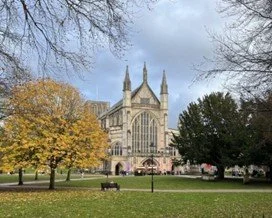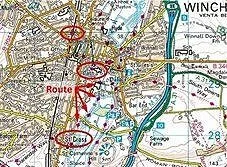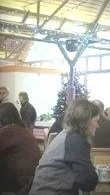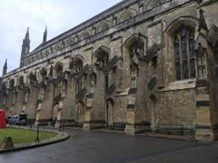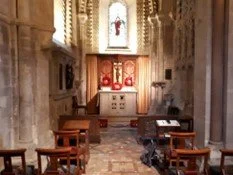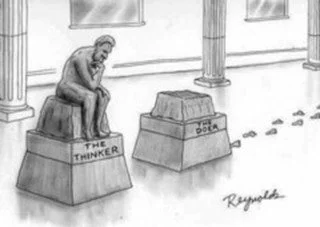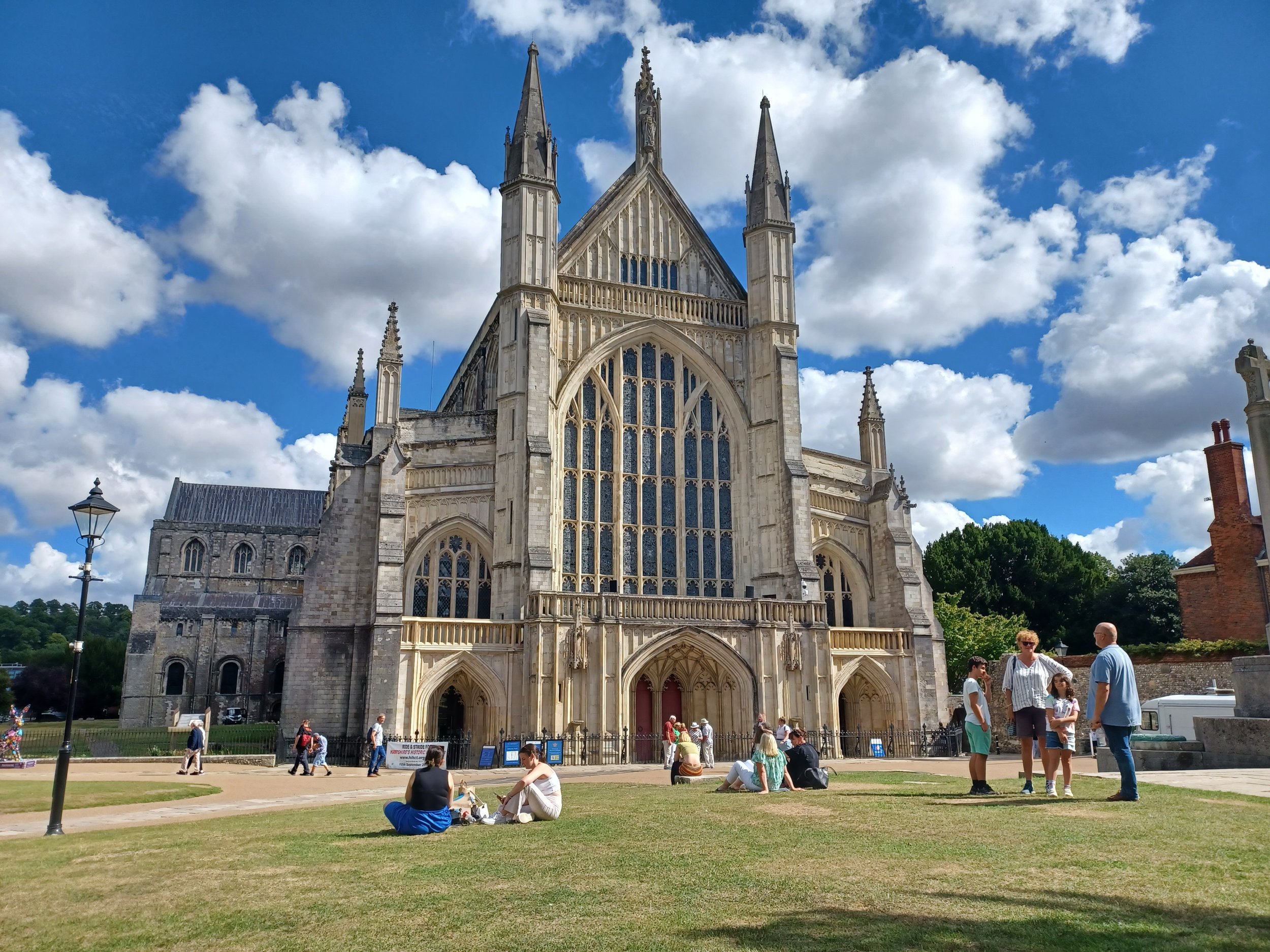
A step-by-step illustration of a Neighbourhood Pilgrimage
A pilgrimage in your immediate locality
Consider your current neighbourhood and think about a journey within it. We can meet with God anywhere, but your chosen goal or destination may facilitate your focus, because of what it means to you.
At some point in the chosen locality, some like to identify a ‘thin place’. This is somewhere where it is easier to hear from Him. (For more on 'thin places' see explorefaith's page "Where can I touch the edge of heaven?")
There are no hard and fast rules with regard to the time spent on each stage, it could be a few minutes or a much longer period, depending on your circumstances.
In this illustration of a Neighbourhood Pilgrimage, the steps are laid out sequentially but this is only a guide or framework. The steps can be used flexibly, according to need and preference.
Mike Gibbons and I undertook a Neighbourhood pilgrimage together. This page provides an account of our experiences.
1. Holy Longing
“Examine yourselves”, 2 Corinthians 13.5
Your pilgrim journey begins with new thoughts or experiences that are in some way challenging, or a desire to examine a specific Scripture.
Yearning - ask yourself, what is the 'holy longing' or 'restless searching' that is prompting you, personally, to make a pilgrim journey?
For me, the ‘longing’ came as consequence of a previous exercise in which I considered nine “spiritual styles”, to see which of them most naturally connected me with God. My preferred style was “rational”, characterised by “striving for explanations”. However, this can be at the expense of the opposite style, which is termed “enthusiastic” or “charismatic”, characterised as openness to the power of God. I felt challenged to explore this imbalance.
Mike was seeking guidance for his next career move so he used the pilgrimage to seek God’s will.
Identify a suitable destination.
For the destination, we agreed on the almshouses and church of St Cross in Winchester. There are attractive water meadows on the walk from the centre of Winchester together with the historic associations of St. Cross itself. For more information see the Web site The Hospital of St Cross.
Plan the practicalities of your day, just as you would for a day’s excursion of any kind.
When planning the day we took into account the relatively limited hours of daylight for the time of year, the good train service from our homes to Winchester, and our preference for sheltered places for both mediation and rest.
The route taken is shown in the map; a leaflet about the route, called the Keats Walk, may be downloaded from the Winchester Tourist Information website.
No special ‘pilgrim’ clothes were worn, only those appropriate for the forecast of a chilly and cloudy day. We mutually agreed beforehand that phones were used to take photographs, but were otherwise kept on silent, only periodically checking as appropriate.
In preparation for the journey itself, Mike prepared a paper copy of the Scriptures he was using while I had a Bible app on my phone. A Kindle would have been a practical alternative, or we could have used a Bible.
Scripture - Identify the issue that is of significance to you, together with a relevant passage of Scripture to explore.
With regard to a choice of Scripture, I felt led to explore Romans 8.1-17, which in the NIV is entitled ‘Life through the Spirit’ and contains the verse “For those who are led by the Spirit of God are the children of God.” Romans 8.14
Mike was seeking guidance for his next career move so he chose four passages of Scripture relating to seeking God, trusting him and his will:
Psalm 63.1, suggested by me:
“You, God, are my God, earnestly I seek you; I thirst for you, my whole being longs for you, in a dry and parched land where there is no water.”Proverbs 3.5-6, suggested by his wife:
“Trust in the LORD with all your heart and lean not on your own understanding; in all your ways submit to him, and he will make your paths straight.”Romans 12.1-2, particularly the sentence
“Then you will be able to test and approve what God’s will is — his good, pleasing and perfect will.”Colossians 1.9b-10, particularly the phrase
“We ask God to fill you with the knowledge of his will, with all the wisdom and understanding that his Spirit gives.”
We both used the following pattern when reading our chosen passages:
Read - slowly read the passage into which you wish to journey
Think - about what you are reading, focusing on each part of the passage
Re-read - the passage several times
Listen - be attentive to God in the silence, constantly listening for the prompting of the Holy Spirit.; see if a word or phrase is particularly relevant for you
The next three stages, ending with the Servant Response, took a full day, starting mid-morning and concluding in the early evening. This is simply our experience on this occasion. How long you spend will vary with how you feel led, opportunity and circumstances.
2. Pilgrim Journey
“Set your heart on pilgrimage”, Psalm 84.5
During your journey, mediate on the Bible verses you are reading as you review and reflect on your thoughts and experiences.
Journey - The distance you travel may be relatively short. Nevertheless, it is still your pilgrim journey; keep yourself alive to the ideas, impressions and experiences you encounter and receive..
For us, the actual journey began mid-morning when we were dropped off at Fleet railway station. We boarded a train to Winchester then walked down into the city and entered the Cathedral Close.
Even though it was a weekday the city was bustling and vibrant, with shops and street stalls decked out for Christmas. Both the railway journey and the atmosphere within the city provided lots of opportunity for comment and discussion. Interspersed with that, given our tacit awareness that we were on pilgrimage, we also found ourselves quite naturally discussing the things that have prompted us to make the journey in the first place. This proved to be the continuing pattern throughout the day.
Having reached the cathedral, we went into the refectory and had coffee and cake. By common agreement we used this space and time to separately and privately meditate on the passages of Scripture that we brought with us.
In due course we resumed our journey, across the busy Christmas market, out of the city and into the water-meadows of the river Itchen.
The walk across the water-meadows to St Cross took about an hour, perhaps just less. The day was dry and bright, although overcast. It was very pleasant walking beside the clear chalk stream with its surrounding meadows and the distinctive outline of St Catharine’s hill in the distance.
In due course we arrived the Hospital of St Cross and Almshouse of Noble Poverty. This is a medieval almshouse founded in the 12th century, the oldest charitable institution in the UK.
Companionship - Maintain an awareness of God as your companion on the journey, as well as any friends who may accompany you.
Meditate - At convenient and appropriate places during your journey, make time to meditate on your chosen Scriptures.
There where places which might have tempted us to pause for more formal times of reflection, but it was a bit chilly for that! As it was we simply walked along, periodically chatting and taking in the sights..
3. Prayerful Arrival
“Be transformed by the renewing of your mind”, Romans 12.2
Your reflections during the journey become formulated into definite thoughts and prayers, forming new ideas or modifying existing concepts.
Arrival - Once you have arrived at your destination, pause and take stock of your recent experiences. This is the place to which ultimately you have been journeying; the value of the place rests in the fact that the anticipation will help us dwell and rest in the presence of God. It becomes a ‘thin place’, a place where heaven and earth are close.
Abide in God - Spend time dwelling and resting in the presence of God
We entered the picturesque church and sat in warm tranquilly of the nave. This became one further time to meditate upon the Scriptures relevant to issues that we were exploring.
Pray - Speak to God about your recent journey, reflecting back what you have discovered during your meditation
For me, the following elements were prayerfully brought before God:
The willingness to surrender and be “led by the Spirit of God”, Romans 8.14
Recognition of the factors holding me back and the reluctance to relinquish control, consistent with a humanly rational approach to life with the attendant fear, anxiety and dread that might accompany surrender.
Mike’s thoughts took two directions:
Many people do live in the dry and parched land of Psalm 63.1. Who is praying the prayer of the Colossians passage for them?
The instruction in Proverbs to not “lean on your understanding” does not mean we should abandon our intellect, as the Romans passage makes clear when it says our minds should be transformed and we should test and approve God’s will. Rather, we must avoid using intellect as a prop that prevents us trusting in God.
Mike wrote notes throughout the pilgrimage which he found helpful for ordering his thoughts.
Give thanks for all that has been shown to you along the way
Confess - Recognise the thoughts that may have led you astray
Entreat - Ask God to give you the wisdom and courage to enter into all he has been showing you. Pray that you will receive blessing through the transformed ideas and memories that your reflection on his Word has awakened.
To keep up the sense of journey we relocated again, this time each going into a separate side chapel on either side of the sanctuary.
For me, the quiet intimacy of the separate space, hallowed by use, proved a very helpful place to think about the apostle Paul’s prayer, that God may “strengthen you with power through his Spirit in your inner being, so that Christ may dwell in your hearts through faith.” Ephesians 3.16-17. To reflect on one’s experience to the living reality of that prayer, together with the response engendered, is a very salutary and personal experience.
Mike didn’t make lots of notes for this stage, instead enjoying the calm, almost blissful experience of abiding in God. A few thoughts came to mind, notably how time spent with God resets one’s perspective on many things.
As we abided in God, one of the staff was moving around the church preparing for a discussion about a wedding. It meant we had to concentrate despite the noise which illustrated the need to focus and actively “abide in God”.
4. Servant Response
”Love one another”, John 13.34
Prompted by what you have learnt on your journey, commit to appropriate areas of service in God’s Kingdom.
The Return - You begin to reflect on this on your journey home, as well as at home itself.
Decide how you will respond to the insights received during your pilgrimage.
Review your resources
It may be useful to discuss your promptings with other people; this can be particularly helpful to test the legitimacy of what you have been hearing
Decide if there is something specific to do
Plan to put into practice your new understanding
Be prepared to hear the call to further journeys
We left the church and went across to the Porter’s lodge of the almshouses where we asked for the Wayfarer’s Dole. The Hospital of St Cross is famous for its ancient tradition of providing Dole, a beaker of beer and a bit of bread given to any visitor who requests it. The custom was founded by a monk from Cluny in France, whose holy order always gave bread and wine to travellers. The tradition still continues today, visitors may request the Dole at the Porter’s Lodge as they depart. (Anyone may go to Porter’s lodge and ask for the Dole and then be free to go on their way. However, there is in charge if you choose to go into the alms-houses, church and gardens.)
Afterwards we left St Cross and went a couple of hundred yards down the lane to the nearby pub, The Bell Inn. Its website had the following to commend it: “Set in the outskirts of Winchester, The Bell Inn boasts a warm and friendly atmosphere with an open log fire. Delicious food to tantalise your taste buds and a refreshing range of beers, wines, ciders and ales.”.
By this stage in the day, we thought that might suit our needs so we went in and were not disappointed, enjoying the beer and a hot sausage sandwich apiece. It was also time to start thinking and talking about the practical outworking of our Pilgrim experiences. This conversation began in the Inn and continued throughout the journey home, and beyond that too, as with the insights gained can take a while to fully assimilate.
For me, the challenge may come from a superficially simple book, which nevertheless may provide the necessary challenge be more open to the Spirit’s leading. “The 10-Second Rule: Just Do The Next Thing” by Clare De Graaf is a book that invites a more spontaneous response to seemingly chance encounters. At the time of writing, this is forming the basis of is continuing journey and a further pilgrimage (an account of this further pilgrimage can be found here).
For Mike, the day had been highly enjoyable and also very useful as time spent deliberately with God, thinking about the passages of Scripture that he had used. The conclusion of the meditations is the need to balance use of intellect and trust in God when considering jobs and one’s career. A separate abiding thought is the importance of praying that others will be filled with the knowledge of God’s will, as Paul prayed for the Colossians.

